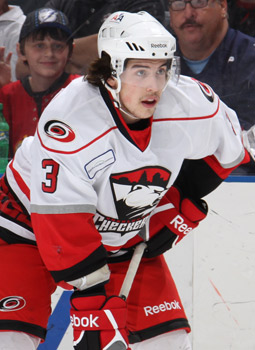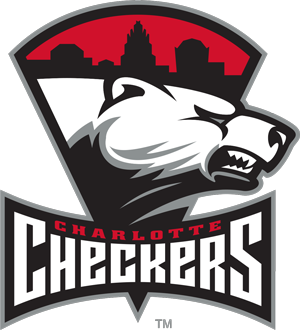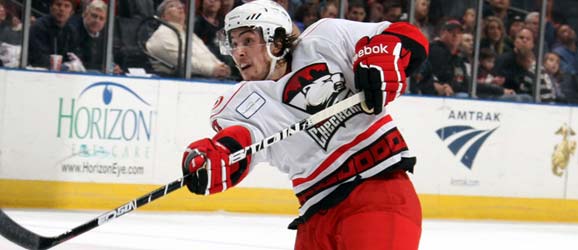On one hand, Faulk is just 20 years old, which is young even for the AHL. However, given that he led all Carolina Hurricanes players in average ice time per game and made the NHL’s All-Rookie Team at 19 last season, he has proven to be no ordinary defenseman. While many at his position spend several years in the AHL honing their skills, he essentially bypassed it entirely, playing just 12 regular-season games prior to this season.
Now that the NHL’s labor stoppage has brought him back to the Checkers, the early results have been just as one might have expected.
To put it simply, he’s out of his league.

All Faulk did in his first game, Saturday’s win in Houston, was assist on all three Checkers' goals and fire seven shots on goal, more than any other player on the ice. That was in addition to playing extensively in every situation, much as he did for the Hurricanes in his rookie season.
It wasn’t as if Faulk, the Hurricanes’ second-round pick (37th overall) in 2010 was playing in the same AHL he seemed to have left for good in November of last season, either. Houston has a handful of forwards in similar situations as Faulk, all of whom came away empty-handed in Saturday’s match-up.
“They had that first line of (Jason) Zucker, (Charlie) Coyle and (Mikael) Granlund, and all three of those guys would have a good chance to be in the NHL,” said Faulk. “Every team is going to be better, and I think that just raises the playing field and makes it a better league all around.”
That’s part of what’s made Faulk playing in the AHL worthwhile, even if his rookie season, which included a stellar performance for Team USA at the World Championship, proves that he’s good enough to have graduated for good. A quick glance at AHL rosters and early-season score sheets includes a host of the world’s best young players, so much so that Faulk has actually flown under the radar at the national and league level. When it comes to assessing the Checkers as a team, as much attention has been paid to who isn’t on it (Jeff Skinner) as who is.
Even after two games, Daniels, now starting his fifth season as an AHL coach, said he’s noticed the difference in the level of play.
“Without a doubt,” he said. “The intensity was really high right from the get-go on opening night, whereas usually it’s there in midseason and you kind of gradually build towards that.”
Part of that could be due to a different attitude across the league in what has shaped up to be a unique start to the season.
“I think everyone is excited this year,” said forward Zach Boychuk, who leads the Checkers with four points early in his fourth AHL season. “No one has been sent down from Carolina yet and there isn’t that shock that comes with that. Right now, this is the best league in North America.”
It remains to be seen how long that will be the case, with the NHL and the NHL Players Association showing signs of real progress in their negotiations this week. Whenever the lockout ends, some of the AHL’s top talent will move up and some will stay, depending on early-season results and the amount of room on NHL rosters, which will quickly reload with locked-out players.
That being said, in Faulk’s case, there’s no doubt whatsoever.
“He’s an NHL player,” said Daniels.





